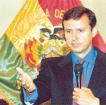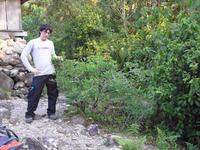Only three more months to elections!
I am living through interesting times as there are elections in December following the enforced resignation of Carlos Mesa in June 2005 and his replacement by an interim President. It must be said though that a six month election campaign is long by any standards and I am not sure too many people in the UK could cope with listening to Blair and Howard slug it out for that long - it would probably provoke mass emigration.
There are two clear front runners in the forthcoming presidential elections:
 Jorge “Tuto” Quiroga, a former Texas-based IBM executive, who rose to prominence as the Vice President to the nation’s former dictator (later turned politician), Hugo Banzer. The fact that Quiroga willingly served as number two to the man who was Bolivia’s version of Augusto Pinochet in the 1970s does not seem to be of much interest to most people.
Jorge “Tuto” Quiroga, a former Texas-based IBM executive, who rose to prominence as the Vice President to the nation’s former dictator (later turned politician), Hugo Banzer. The fact that Quiroga willingly served as number two to the man who was Bolivia’s version of Augusto Pinochet in the 1970s does not seem to be of much interest to most people.
 Evo Morales, who rose to prominence as leader of the coca growers and is the sworn enemy of the current US regime. Analysts on the left cast him as a charismatic leader who represents rising indigenous power and new wave Latin American socialism all in one. Critics on the right demonize him as a stooge of the leftist governments in Venezuala and Cuba who who is pushing Bolivian democracy to the brink.
Evo Morales, who rose to prominence as leader of the coca growers and is the sworn enemy of the current US regime. Analysts on the left cast him as a charismatic leader who represents rising indigenous power and new wave Latin American socialism all in one. Critics on the right demonize him as a stooge of the leftist governments in Venezuala and Cuba who who is pushing Bolivian democracy to the brink.
 The elections are further spiced up by (the inevitable) US intervention. Secretary of Defense Donald Rumsfeld on a recent tour of Paraguay joined in the Bush administration’s recent pattern of blaming Fidel Castro and Hugo Chavez for Bolivia's political turmoil: "There is certainly evidence both Cuba and Venezuela have been involved in the situation in Bolivia in unhelpful ways." The BBC report went on to note that Rumsfeld offered up no actual evidence to support his claim.
The elections are further spiced up by (the inevitable) US intervention. Secretary of Defense Donald Rumsfeld on a recent tour of Paraguay joined in the Bush administration’s recent pattern of blaming Fidel Castro and Hugo Chavez for Bolivia's political turmoil: "There is certainly evidence both Cuba and Venezuela have been involved in the situation in Bolivia in unhelpful ways." The BBC report went on to note that Rumsfeld offered up no actual evidence to support his claim.
Information on the internet which has recently been substantiated in the Bolivian press also reports that the U.S. is constructing a 16,000 troop military base in Paraguay, 200 kilometers from the Bolivian border, with an airforce capacity greater than Buenos Aires airport. Bearing in mind that Paraguay’s airforce in this region only numbers about a dozen planes (well, something like that), what does this say about US intentions and what does this mean for Bolivia? Bolivia’s political instability is, in good part, a product of foreign influence, but it has little to do with Venezuala and Cuba, and much more to do with other outside influence: namely the Bechtel Corporation, World Bank, IMF, the US Government´s war on drugs (that´s me pictured right with the infamous coca plant in Chapare) and foreign energy companies like our very own British Gas and British Petroleum.
Bolivia’s political instability is, in good part, a product of foreign influence, but it has little to do with Venezuala and Cuba, and much more to do with other outside influence: namely the Bechtel Corporation, World Bank, IMF, the US Government´s war on drugs (that´s me pictured right with the infamous coca plant in Chapare) and foreign energy companies like our very own British Gas and British Petroleum.
Links with more in-depth information courtesy of the excellent Democracy Centre, based here in Cochabamba.

0 Comments:
Post a Comment
<< Home